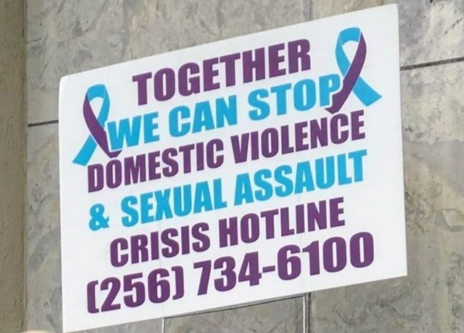CULLMAN, Ala. – On Friday, Cullman Police Chief Kenny Culpepper reported to The Tribune that cases of domestic violence are on the rise around Cullman, as families become more confined to their homes under the stress of uncertainty.
Said Culpepper, “As people are having to spend more time with each other, when they can’t go out and there’s nothing to do if they do go out, the tension becomes more likely to lead to domestic violence.”
By the numbers
A review of Cullman area crime statistics from March shows that rates of domestic violence incidents have increased, along with other named crimes that often involve domestic issues, including harassment, menacing and violation of protective orders.
From March 1-15, the Cullman County Sheriff’s Office (CCSO) recorded 23 domestic violence incidents and 18 related incidents, while the Cullman Police Department (CPD) recorded six domestic violence incidents and five related incidents.
Around and following that time:
- On March 12, Cullman Mayor Woody Jacobs issued his first official statement on COVID-19, saying the city government was watching and preparing.
- The following day Cullman Regional Medical Center (CRMC) implemented restrictions on patient visitation as Gov. Kay Ivey announced that public schools would close on the 19th.
- On March 16, CRMC stepped up its visitation restrictions as the City of Cullman declared a state of emergency and the state announced that workers laid off due to the virus could receive unemployment benefits.
- On March 18, the County Commission closed the Courthouse and all county offices.
- On March 19, schools officially closed and the county school system began food distribution, as a statewide health order closed restaurants and bars in on-premise patronage.
- On March 20, Cullman County’s first COVID-19 patient was identified as a Cullman physician. The state updated its health order with more restrictions on social gatherings, the Governor authorized the use of the National Guard and CPD Chief Kenny Culpepper announced, “We will enforce social distancing measures.”
- On March 24, CARTS changed some of its procedures while the city school system began food distribution.
- On March 26, Gov. Ivey closed schools for the remainder of the school year.
- On March 28, the Governor closed “non-essential” businesses.
Through this period, from March 16-31, the CCSO saw domestic violence incidents rise to 33 with 29 related incidents. The CPD reported nine domestic violence incidents and four related incidents, a drop in related incidents but a 50% increase in domestic violence calls.
Sheriff Matt Gentry told The Tribune that the rise in calls is due to a combination of rising stress levels and a recent streamlining of the procedure for making incident reports, saying, “With regards to the domestic violence calls, I think what you’re seeing, first, our coverage area is very large in Cullman County. But, second, when you have a situation like the quarantine and your stress level goes up, then it’s causing people to become agitated. And when you’re at home, you become agitated together. So we did see a small rise in our domestics going up.
“The non-related domestic reports going up, I think one of the things you see with that is the ability to call in and file reports over the phone, now. With the quarantine, we’re trying to minimize people’s exposure, so we’re allowing them to call in and make reports on non-emergency issues. So you may see a little rise in those types of issues because of the easy access, easy availability just to call and make a quick report.”
The trend of rising domestic violence has spread around the world, following the virus. Authorities from China to Europe and across the United States have reported elevated levels of domestic violence.
Cullman Victim Services Executive Director Carol Horstman shared:
“We know that during times of crisis, the risk of domestic violence increases.
“Domestic violence is rooted in power and control. Right now, we are all feeling a lack of control over our lives. For an abusive person, this creates an even more dangerous situation because they may take it out on their victim. This means people who were already in an abusive situation could be facing more extreme violence, but they no longer have the escape of going to work or seeing friends. Added to that, the fear of exposure to COVID-19 may keep them from taking refuge with family or friends or from seeking medical care after physical abuse.”
The National Domestic Violence Hotline says:
Avoiding public spaces and working remotely can help to reduce the spread of COVID-19, but for many survivors, staying home may not be the safest option. We know that any external factors that add stress and financial strain can negatively impact survivors and create circumstances where their safety is further compromised.
Abuse is about power and control. When survivors are forced to stay in the home or in close proximity to their abuser more frequently, an abuser can use any tool to exert control over their victim, including a national health concern such as COVID-19. In a time where companies may be encouraging that their employees work remotely, and the CDC is encouraging “social distancing,” an abuser may take advantage of an already stressful situation to gain more control.
Here’s how COVID-19 could uniquely impact intimate partner violence survivors:
- Abusive partners may withhold necessary items, such as hand sanitizer or disinfectants.
- Abusive partners may share misinformation about the pandemic to control or frighten survivors, or to prevent them from seeking appropriate medical attention if they have symptoms.
- Abusive partners may withhold insurance cards, threaten to cancel insurance, or prevent survivors from seeking medical attention if they need it.
- Programs that serve survivors may be significantly impacted –- shelters may be full or may even stop intakes altogether. Survivors may also fear entering shelter because of being in close quarters with groups of people.
- Survivors who are older or have chronic heart or lung conditions may be at increased risk in public places where they would typically get support, like shelters, counseling centers, or courthouses.
- Travel restrictions may impact a survivor’s escape or safety plan – it may not be safe for them to use public transportation or to fly.
- An abusive partner may feel more justified and escalate their isolation tactics.
Here’s what our Advocates have heard from some survivors reaching out:
- “A chatter mentioned that the abuser was using the virus as a scare tactic to keep the survivor away from their kids.”
- “A chatter said the abuser was using COVID-19 as a scare tactic so that they would not visit family.”
- “A health professional still living with their abuser called and said they were physically abused that night because their abuser was sure they were trying to infect them with COVID-19.“
What to do
For those who find themselves in an abusive situation, the National Domestic Violence Hotline advises:
Create a safety plan.
A safety plan is a personalized, practical plan that includes ways to remain safe while in a relationship, planning to leave, or after you leave. Here at The Hotline, we safety plan with victims, friends, family members, and anyone who is concerned about their own safety or the safety of someone else.
You and your partner may be told by either or both of your employers to work remotely to limit social interaction. Having a safety plan laid out can help you to protect yourself during this stressful time. You can learn more about safety plans here, and you can find an interactive guide to safety planning here.
Because there may be limited shelter availability due to COVID-19, consider alternatives such as staying with family or friends, staying in motels, or sleeping in your vehicle. Be extra mindful of good hygiene practices if you’re leaving as well – wash your hands regularly, avoid touching your face, minimize contact with surfaces that other people have had contact with, etc.
Practice self-care.
COVID-19 is causing uncertainty for many people, but getting through this time while experiencing abuse can feel really overwhelming. Taking time for your health and wellness can make a big difference in how you feel. To learn more about how to build in self-care while staying safe, you can learn more here.
If you’re a friend or family member of someone experiencing abuse, you may not be able to visit them in person if you live in an area where there are COVID-19 cases. Seeing someone you care about being hurt is stressful. Remind yourself that you can’t make decisions for someone else, but you can encourage your loved one to think about their wellbeing, safety plan and practice self-care while they are in their home.
Reach out for help.
While people are encouraged to stay at home, you may feel isolated from your friends and family. Even if you are isolated, try to maintain social connections online or over the phone, if it is safe to do so, and try to stick to your daily routines as much as possible.
Victim Services offers local help
Horstman told The Tribune, “Victim Services has been seeking new ways to support victims during this health crisis. Because we understand it might be difficult for a victim to call our 24-Hour Help Line if they are at home with their abuser, we offer the additional options of online chat through Facebook messenger and texting. We hope this will make it easier and safer for victims to seek out help and support. Our shelters are open to receive anyone who needs a safe place to escape and we are taking every precaution to protect the health of our shelter guests and staff. Counseling is also available via telephone or online.
“We want the community to know that we are here for them and they can reach out anytime for help, or just to talk to someone if they are feeling isolated or anxious while under COVID-19 restrictions.”
Local contacts
24 hr. Help Line 256-734-6100 – calls only
24 hr. English/Spanish text or call – 256-708-4769
Facebook messenger @victimservicescullman
From the National Domestic Abuse Hotline
“For any victims and survivors who need support, we are here for you, 24/7. Call 1-800-799-7233 or 1-800-799-7233 for TTY, or if you’re unable to speak safely, you can log onto thehotline.org or text LOVEIS to 22522.”
Gentry concluded, “This is a stressful time for everybody, but I’m proud that we live in the greatest community in the state of Alabama. We need to take care of each other, have patience with each other and just continue to work to make a bad situation better. And we can do that by working together.
“I’m proud of the effort that the sheriff’s office- the deputies, investigators, dispatchers, detention deputies- everybody’s giving to make this place better and safe during a bad situation.”
Copyright 2020 Humble Roots, LLC. All Rights Reserved.































